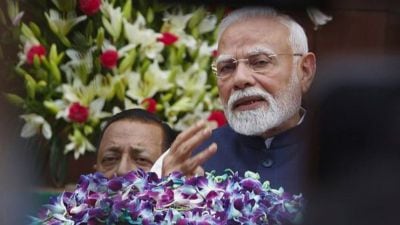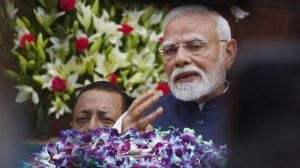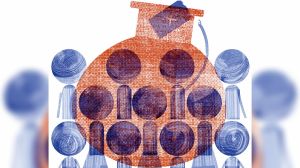Amartya Sen: Santiniketan of Satyajit Ray, Nandalal Bose… It isn’t there right now
The house, Pratichi, was built by his father on land leased by Visva-Bharati University (VBU) that Rabindranath Tagore set up in Santiniketan, a neighbourhood of Bolpur in West Bengal’s Birbhum district, in 1921.
 Amartya Sen at his house in Santiniketan. (Express photo by Partha Paul)
Amartya Sen at his house in Santiniketan. (Express photo by Partha Paul) Sitting on a wooden chair in the backyard of his home in Santiniketan, Amartya Sen recalled the days he spent there in his childhood — how he came to live there for an extended period during the Second World War, the early morning walks with his maternal grandfather, and how the time spent with his grandfather sparked an interest in literature and linguistics.
The house, Pratichi, was built by his father on land leased by Visva-Bharati University (VBU) that Rabindranath Tagore set up in Santiniketan, a neighbourhood of Bolpur in West Bengal’s Birbhum district, in 1921. Now, the house is at the centre of a dispute with the university, which has named Sen in a list of illegal occupants on the campus and accused him of occupying excess land belonging to it.
Sen, in an interview to The Indian Express, explained the significance of Santiniketan in his life. His maternal grandfather Kshitimohan Sen was the vice-chancellor of Visva Bharati. Sen was born in Santiniketan and after living for some time in Dhaka and Mandalay (in Myanmar) he moved to Bolpur during the Second World War. His father Ashutosh, who used to teach at Dhaka University, thought it was a safer option than Kolkata and Dhaka.
“I was born in Santiniketan. I do not remember being born but I do remember being here as a very young lad. Some of the time, yes, I lived here with my maternal grandparents Kshitimohan Sen and Kiranbala Sen. Those were wonderful times. My father was convinced that as a metropolitan city both Dhaka and Kolkata would be bombed by the Japanese but no sensible Japanese was going to try and bomb Santiniketan. And when the Japanese went back home, I refused to go away. I wanted to stay on here,” said the 89-year-old.
“My grandfather was a famous Sanskrit scholar of many dimensions. I liked that life. We used to get up at 4 am and go for walks when the sky was still dark. He knew the names of all the stars in Sanskrit. We talked about them and the science of astronomy. I was very interested in the history of Sanskrit and Pali when I was young. And so, I spent a lot of time doing literature, language, and linguistics and so it went well. I was happy.”
Asked what he likes about Santiniketan, the Nobel laureate said, “This is my home. I rest here, I enjoy my time here. I have written several books here. I like the quietness. The peace and the creative opportunities Santiniketan offers not just to me but to anyone.”
Sen recollected a conversation he once had with filmmaker Satyajit Ray who was a student at Kala Bhavana, the fine arts faculty of Visva Bharati. One of Ray’s teachers was Nandalal Bose, who is counted among the pioneers of modern Indian art.
“Even great people — I am not comparing myself with him — but when I talked with Satyajit Ray, he said, ‘Yes, I could think, I could ask the question why does a leaf go up and not down and so on?’ So, I asked, ‘How did you think about it?’ He said, ‘Nandalal Bose.’ It raised a question, it remained stuck in my mind. It went round and round in my mind. That is the Santiniketan I remember. And that Santiniketan isn’t there right now. Maybe it will come back. But very unfortunate that at least temporarily it is gone.”
Explaining his unhappiness with the current state of affairs at Visva Bharati, Sen said, “I can’t think of such a great place having such a meagre and poor fraternity as it has now. How it has got that way, I don’t know. It can’t be all of the present Vice-Chancellor’s fault, though he must have some responsibility for it. Santiniketan has had a catastrophic decline.”
On January 24, Visva Bharati issued a letter to Sen, demanding that he hand over the excess land that it claimed he held. It had issued similar notices earlier too. Last week, Chief Minister Mamata Banerjee met Sen to give him documents related to the land in question and directed officials to provide the Nobel laureate with Z-plus security. In an interview, V-C Bidyut Chakraborty told The Indian Express that the documents Banerjee gave Sen were “absolutely invalid and irrelevant”.
“Whatever I am saying, I am saying based on the documents at our disposal. There are three ways of going forward. First, Prof Sen may move court. The second option is to allow the measurement of the land in the presence of Prof Sen or his representative, a government representative, and in our presence. Third, let Amartya Sen hold discussions with us and tell us why he needs the extra 13 decimals of land. Probably, we can reconsider his appeal,” said the V-C.
Following Banerjee’s directives, the government set up a police outpost at “Pratichi”. The house has almost become a tourist spot. Outside the gate, guides narrated to visitors the Sen family’s history, the economist’s accomplishments, and even the land dispute.
Referring to Chakraborty, Sen said, “He (V-C) says that Amartya got some property back with the help of the chief minister but there is nothing about him there (in the land records). I was seven then. I think it would be rather amazing if there were pages after pages written about my property rights at the age of seven.”












